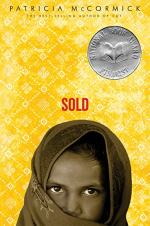|
This section contains 2,386 words (approx. 6 pages at 400 words per page) |

|
Gender Inequality
Gender inequality is an important theme in the novel “Sold” by Patricia McCormick. Gender inequality constitutes the intentional or unintentional difference in treatment, behavior, social standing, and rights – moral and legal – between men and women, to the detriment of one gender at the infliction of the other. In “Sold”, it is men who hold power over women, and women who must submit to men. Gender inequality greatly influences the plot of the novel, and is responsible for much of the misery and suffering experienced by Lakshmi.
In her home village in Nepal, men have the upper hand against the women. Men run the village, have the power in politics, are dominant in the legal system, and hold sway over their women at home to the point that women are not even allowed to eat at the same time as men, but must eat after them...
|
This section contains 2,386 words (approx. 6 pages at 400 words per page) |

|




